How to Sell a Website: The Ultimate Guide
Considering selling your website? If you're looking to move on from your digital venture or aiming for a profitable exit, you'll need to plan the next steps carefully to maximize your return on investment.
In this guide, we'll navigate you through the entire process of selling a website. You'll learn how to prepare your site for sale, assess its value, enhance its appeal for higher profit, select the ideal platform for selling, and smoothly transfer ownership to the new owners.
Before Selling: Essential considerations
Chances are that you've already invested a considerable amount of time and work into your website. To make it all worth the effort, you'll want to sell it for as much as possible. Before listing it for sale, it's crucial to prepare your website to ensure it presents its best face to potential buyers.
Have Your Website Appraised
It's much easier to establish a fair sale price and engage in negotiations with potential buyers if you have a clear understanding of your website's value. Fortunately, there are established methods and rules of thumb to help you calculate it:
Price-earnings ratio
A key method to assess your website's value is through its price-earnings ratio (P/E ratio). Calculate this by multiplying your monthly revenue by an earnings multiple, which reflects your website's quality, traffic sources, and revenue streams. Typically, this multiple ranges from 12 to 50, varying based on specific factors of your site.Traffic value For websites generating little to no direct revenue, their traffic value can provide an estimate. Calculate this by determining the cost-per-click (CPC) value of your key keywords and multiplying it by the visitor count they bring to your site.
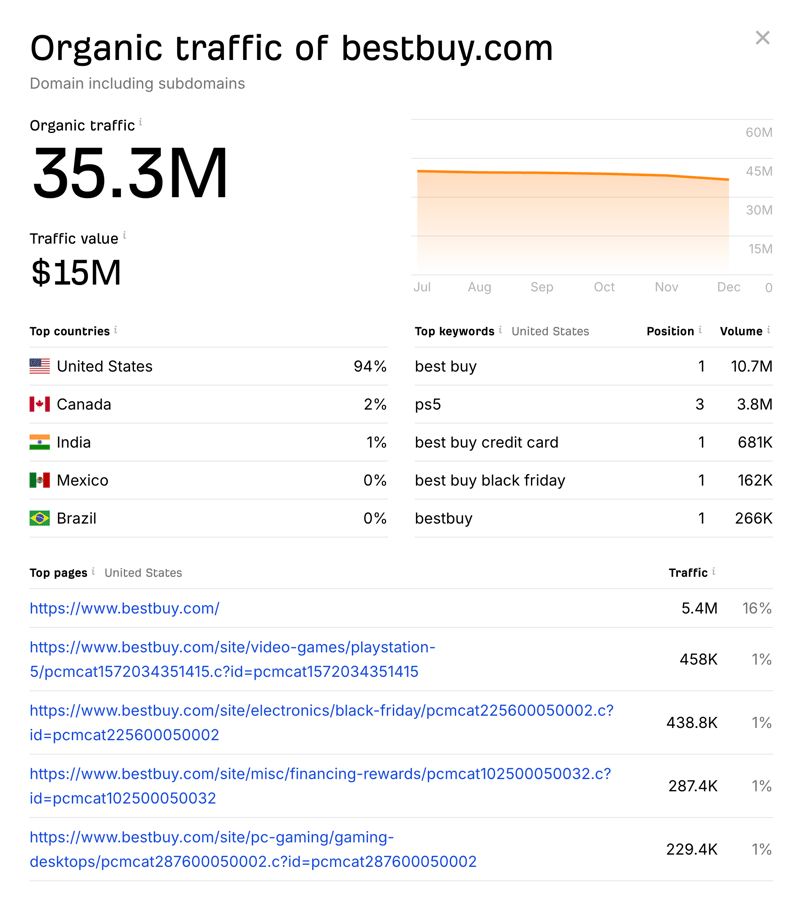
Use the ahrefs Traffic Checker to find out a website's traffic.
Many website marketplaces, more on those later, provide value calculators. These help you calculate the monetary value of your website without needing to understand every detail. Still, you should have a rough idea where these numbers come from and which factors play a role.
Since every website is unique, there's no way to estimate its value with 100% accuracy. While guidelines and online tools can help, a website's actual value ultimately depends on the market: Your website is worth as much as someone is willing to pay for it. This incorporates both objective and subjective factors, which can vary among buyers.
Increase Your Website's Value
Just as you would clean and tidy a car before selling it, enhancing your website’s appearance and functionality can significantly increase its value. Here are a few key strategies to help you increase your website's worth:
Improve its content and design
Take an honest look at your website: Do you like what you see? If not, get to work. A fresh design and great, error-free content can make a strong impression on potential buyers, which impacts their offers. A website that requires no immediate updates is more appealing, sometimes even warranting offers above the asking price.Fix any technical problems
Ensure your website’s loading speed, uptime, mobile responsiveness, and security meet current standards. Like a car with a sound engine, a technically optimized website is more desirable.Diversify your sources of traffic and revenue
Potential buyers might view a website that depends on a single source of traffic (such as Google) and/or income (such as Amazon Affiliates) as risky. Broadening your traffic and revenue streams, for example through advertising, product sales, affiliate partnerships, or social media, can enhance its appeal.Streamline workflows and processes
When it comes to websites with multiple contributors, having structured, documented processes will certainly make them more attractive to investors. A site that relies heavily on the owner for management could be viewed as less valuable, since it will take a lot of work to keep it running.Negotiate with your affiliates
When was the last time you negotiated an affiliate agreement? Revisiting them can sometimes lead to better terms, particularly if you have a history of driving valuable traffic. This can be an essential factor in increasing your site's revenue and, by extension, its sale value.Boost your SEO visibility
Make sure that your website meets SEO best practices and try to enhance organic traffic with targeted SEO measures.Optimize email marketing
A well-organized list of contacts or newsletter recipients shows that you've invested time and energy into customer/client outreach. This can make your website significantly more valuable to potential buyers.
There's a lot you can do to make your website more attractive to buyers, potentially increasing its sale price. However, the sale value of your website is closely linked to its overall quality, success, and reputation, none of which can be fixed overnight. It's up to you how much effort and resources you're willing to invest at this stage.
Organize Your Website's Financialy and Performance Reports
Savvy buyers will scrutinize your website's financial health and performance metrics before placing an offer. They'll pay particular attention to your website's financial and performance data, which are some of the most important multiples in determining its value. Make sure that the documentation you provide is clear and transparent.
Key areas to document include:
Revenue and costs: Detail your income streams—advertising, affiliate commissions, product sales—and operational expenses, including hosting, maintenance, and labor (freelancers or employees). This breakdown helps buyers gauge your website's profitability.
Traffic overview: Demonstrate where your traffic comes from and how it has developed over time. List traffic according to its sources (direct access, search machines, referrals, or social media) to let buyers know your website's strengths and potential weaknesses.
Web analytics: Share essential metrics from tools like Google Analytics, such as visitor count, page views, session duration, bounce, and conversion rates. These figures reveal visitor engagement and how effective your content is.
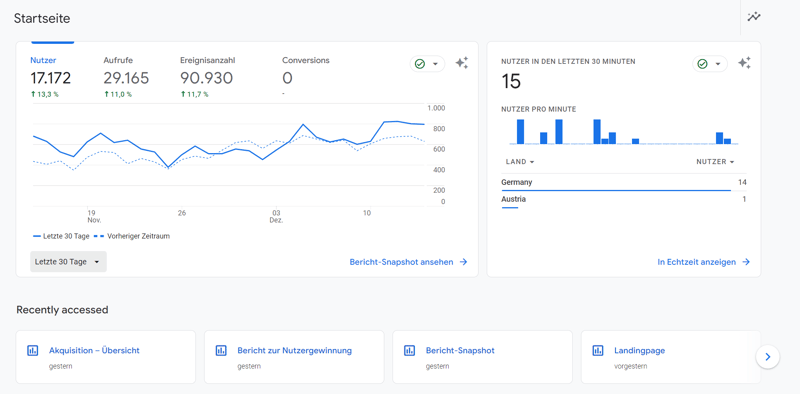
Make sure to include the most important Google Analytics figures, as they're often a focal point for buyers.
SEO performance: Strong SEO performance indicates that your website enjoys sustainable, high-quality traffic. Review your site's search engine rankings, organic traffic flow, and domain authority development.
Where and How to Sell Your Website
With all the preparatory work completed, you can start preparing the actual sale. There are several ways to go about this:
Sell Directly to Interested Buyers
Think you can sell your website on your own? You'll need to pitch it to potential buyers, set an asking price, and handle all negotiations. This requires more effort on your part, but you won't have to pay a commission to a broker or website marketplace.
The first step is to identify potential buyers. Consider reaching out to:
Competitors: Your direct competitors are likely to be interested in acquiring your website, as it can bolster their market standing and grant them access to your content and customer base.
Portfolio owners: These include investors and businesses that already own a range of different websites. They're usually on the hunt for relevant websites to add to their portfolios.
Start-ups: New companies seeking an online presence may find value in purchasing an established website and tailoring it to fit their needs, benefiting from your existing audience and traffic.
It might be helpful to prepare a list of potential buyers, along with notes on the potential benefits your site could offer them.
Once you've identified potential buyers, you'll need to convince them that your website is worth the asking price. While the above-mentioned financial and traffic reports are crucial, they're just one component of an effective sales pitch.
Consider compiling a comprehensive document that summarizes everything that you think will be of interest to potential buyers, including:
a brief description of your website
a list of the reasons for selling
an explanation of why your website is a good investment
financial and traffic reports, as well as other data and statistics
information about how you've monetized your website
By addressing key concerns upfront, you can engage in negotiations with confidence and determine who's actually interested. Once you've secured a buyer, all you'll need to do is draw up and sign a contract, and transfer control of your website, but more on this later.
Maybe a potential buyer takes the initiative and reaches out to you first. That's great — but don't rush into anything:
Consider whether selling at this moment is truly the best decision, or if you'll be able to get more for your website down the road.
Attempt to negotiate a higher selling price.
Based on the offer received, identify and contact other potential buyers to possibly secure an even better deal and/or generate interest from multiple bidders for your website.
Receiving such an offer is always good news. It indicates that someone else has seen the potential in your website. However, remember that no potential buyer is looking to do you a favor out of the blue — they're likely just on the hunt for a great deal.
In short, don't be dazzled by the sum of an unexpected offer. Carefully consider whether the offered amount truly reflects the current and future value of your website.
Use a Marketplace or Broker
Another way to sell a website is through professional sales platforms. These come in two varieties:
- 1.
Marketplaces are places to trade websites — a bit like eBay for digital businesses. Here, you can list your websites and directly engage and negotiate with potential buyers. If the sale is successful, the marketplace receives a percentage of the sale price.
- 2.
Brokers take things a step further than marketplaces by managing the entire sales process of your website. They set the asking price, create a listing, promote it, and (often) conduct negotiations on your behalf. Of course, they receive a higher commission than marketplaces.
Choose the Right Sales Platform
There are many marketplaces and brokers to choose from, each offering different features, terms, and pricing models. We've compiled some of the best and most popular platforms for you:
Empire Flippers: Full-Service Broker for Established Websites and Online Businesses
Empire Flippers is one of the most popular website brokers, supporting the sale of all kinds of online businesses and websites. It's best suited for established websites already generating substantial revenue.
How Does Empire Flippers Work?
Empire Flippers offers a comprehensive brokerage service, taking care of all aspects of selling your website.
After evaluating and vetting your website, they create a listing and market it within their network of buyers. They also assist in negotiating and fine-tuning sales deals, as well as handling the website's transfer to the new owner.
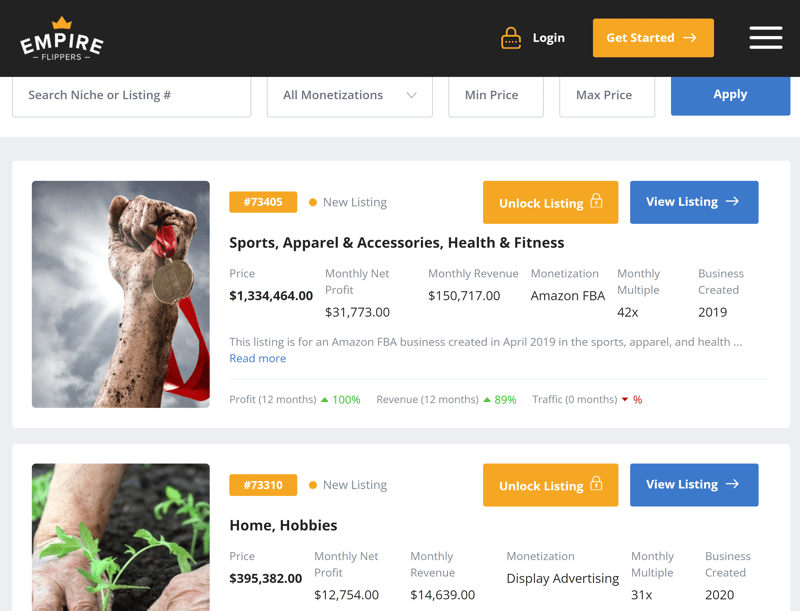
Empire Flippers
Which Websites Can Be Sold on Empire Flippers?
Empire Flippers has fairly strict selection criteria. Here are a few of the requirements:
Your online business must generate at least $2,000 in revenue per month.
You must provide at least 12 months of financial data.
Google Analytics (or Clicky) needs to be integrated for at least 3 months before the listing date.
Websites that are monetized with Adsense, Amazon Associates, use affiliate marketing, or other ads, need to have been on the same domain for at least 12 months.
More than 50% of your income must be derived from different sources. Websites that are dependent upon a single client are not accepted.
Websites that belong to certain niches (as determined by Empire Flippers) or host specific content (gambling, pornography, weapons, drugs, etc.) are prohibited.
The fee depends on your website's business value, or the price at which it is listed:
For listings under 700,000 USD: 15% of the sales price.
For listings between 700,001 and 5 million USD: 15% of the first $700,000, and then 8% of the remainder.
For listings above 5 million USD: 2.5% of any amount above 5 million USD.
As an example, if your website was listed for $1 million, you would pay $120,000 in commission. This would include 15% of the first $700,000 ($105,000) and 8% of the remaining $300,000 ($24,000) for a total of $129,000.
Flippa: Online Marketplace for Websites and Digital Assets of Any Size
With more than 12,000 successful website sales per year, Flippa stands as one of the largest online marketplaces globally. From simple blogs to entire SaaS companies, online stores, or social media accounts, Flippa facilitates the sale of virtually any digital asset.
How Does Flippa Work?
Flippa is a peer-to-peer platform, connecting sellers to buyers and helping with everything from listing to negotiations to payment. There are two options: you can use the platform on a self-service basis or opt for Flippa's broker service, receiving assistance from professional brokers.
In a standard sale (without broker service), you can list your website either as an auction or at a fixed price. You set the price, with the option to seek assistance from the Flippa team for pricing. The website transfer is your responsibility.
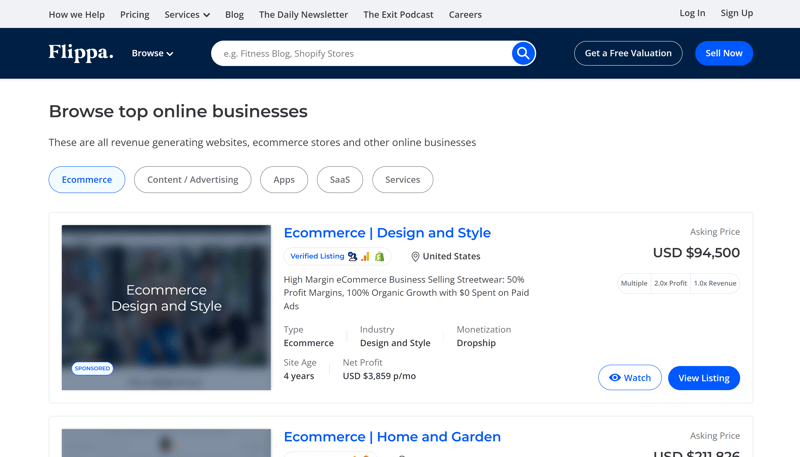
Flippa
Which Websites Can Be Sold on Flippa?
You can sell nearly any type of website (and other assets like apps or domains) on Flippa. The requirements are more relaxed than on other platforms, partly because Flippa merely provides the marketplace and leaves the rest up to buyers and sellers.
You'll need to answer some questions about your website and support your answers with documents. However, Flippa doesn't scrutinize these documents, they're for potential buyers to review. The key requirements are that:
You have the legal right to sell the website in question
You can document your income and traffic claims
Your website isn't listed elsewhere while being auctioned on Flippa
You don't bid on your own website
Total costs on Flippa comprise a listing fee and a commission on a successful sale, both dependent on the listing price of the website.
Commissions range from 10% (for websites under $50,000) to 3% (for websites over $10 million). The listing fee is either a one-time charge for a set listing duration (for websites up to $250,000) or monthly (for websites starting from $250,000).
Listings priced at $250,000 and above receive more comprehensive support from Flippa and additional services from Flippa advisors.
You can find a comprehensive breakdown of all costs on Flippa's website.
Motion Invest: Online Auction House for Smaller Websites
Motion Invest is an online auction house that specializes in the sale of content websites that use affiliate marketing, as well as ad-financed websites that rely on Adsense, Ezoic, and others.
How Does Motion Invest Work?
Motion Invest employs a "Dutch auction" model, listing the website at a price higher than the desired sale price and gradually lowering it until a buyer engages.
Once Motion Invest has checked and approved your website, you'll receive an offer with a starting price. Following a successful sale, their transfer team assists in handing over your website to the buyer. In some cases, Motion Invest buys websites outright, without an auction. When this happens, there's no commission fee.
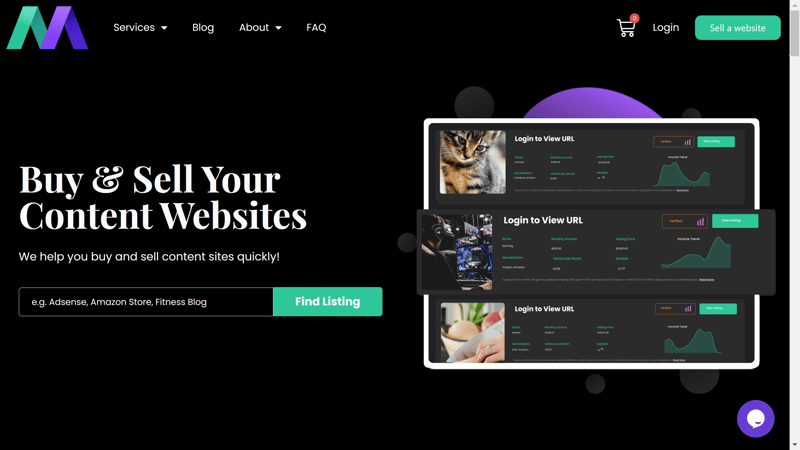
Motion Invest is an auction platform for content websites.
Which Websites Can Be Sold on Motion Invest?
To be approved for sale on Motion Invest, a website must meet the following criterie:
It must be a content website (a blog, review website, information portal, etc.).
All content must be available in English.
More than 80% of the traffic must be organic.
Income must be at least $20 per month.
Traffic must primarily come from the US (potential exceptions include .co.uk and .ca websites).
Commission rates at Motion Invest vary by sale price:
Less than 20,000 USD: 20%
20,000–50,000 USD: 15%
50,000–100,000 USD: 10%
100,000–500,000 USD: 7%
More than 500,000 USD: 5%
Transfer Your Website
Once you've accepted an offer for your website and signed a sales contract, all that's left to do is transfer ownership of your website to the buyer. Some brokers, like Empire Flippers, include this in their service, but most marketplaces require you to manage it.
Transfer steps can vary from case to case, but generally include:
- 1.
Domain Transfer
The primary step involves transferring the domain. Contact your domain registrar to initiate this process. You'll probably need to request an authentication code and give it to the new owner so that they can access the domain. - 2.
Hand over hosting and content
If the site is hosted with a provider, you'll need to transfer the hosting details to the buyer. This may involve migrating website data to the buyer's hosting account. Ensure all website data, including databases, files, images, and other content, is correctly transferred, using migration tools or plugins if available. - 3.
Transfer linked accounts
Websites often use additional services like analytics, monetization, or email newsletters. Ensure access to these services is also transferred to the new owner.
Conclusion
Want to secure the best possible price for your website? You'll improve your chances of success by following a few crucial steps. First, estimate the monetary value of your website, substantiated by reports and analyses. Then, either pitch and sell your website directly to potential buyers or use a marketplace or broker like Empire Flippers, Flippa, or Motion Invest.
Don't undersell yourself or your website: only accept an offer you're comfortable with, and try to get your website in the best shape possible before selling. Learn more about calculating your website value here.
FAQs
You can sell your website on dedicated marketplaces or brokers, such as Empire Flippers, Flippa, or Motion Invest. Alternatively, you can manage the sale yourself, which means handling everything from pitching and communication to the purchase agreement, negotiation, and transfer.
The value of a website depends on many factors, including its profitability, traffic, and reputation. To find out how much a website is worth, you can use online tools, such as those offered by marketplaces and brokers, or methods like the P/E ratio, or profit multiples. Just keep in mind that these are estimates and not set in stone.
The cost of selling a website varies from platform to platform. Most charge a listing fee and take a commission of the sale price, should the website sell. This decreases as the sale price of the website increases. The marketplaces we've looked at charge anywhere from 3-15%.













